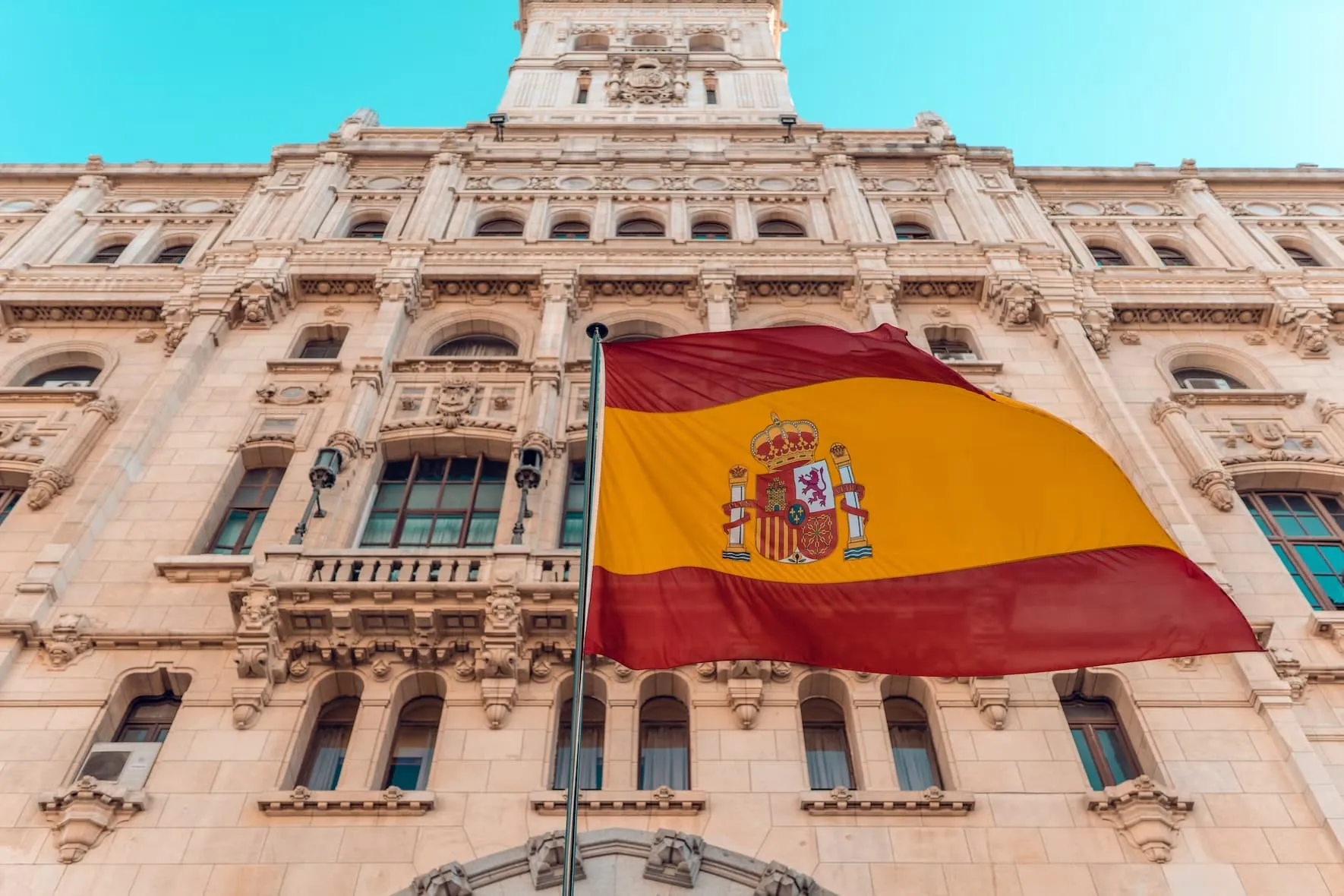Spain Family Visas
If you are a foreign citizen in Spain with a residence permit or Spanish citizenship, you have a right to family reunification. You can have your family live with you in Spain for a long term.
Visit our website for more information on Spain’s Family Reunification Visas, or call us on +44 333 305 9375 for immediate help and assistance with your situation. We’re here to help you in person, via the phone, or online.
Read our 1001 reviews
Request a call back from our immigration experts
Benefits of Choosing IAS‘ Spain Immigration Lawyers
When it comes to obtaining a Spain visa or permit, IAS Spain immigration lawyers are well-equipped to help you.
With IAS’ track record of successfully helping clients visit or immigrate to Ireland successfully, we can help businesses and individuals achieve their goals.
Our dedicated immigration lawyers provide our services through a comprehensive and personalised approach. With IAS, you enjoy:

Expert support from an experienced immigration lawyer dedicated to your success



Support in gathering supporting documents and completing a high-quality application.



Confidence that your case is being handled by an experienced team.



In-house document checks done by lawyers who are accredited by the IBA in Madrid and Seville.
Services we Provide
About Spain Family Visas
Spain Visas for family reunification or reunion enable foreign citizens to have their family members live with them in Spain. The family members are non-EU/EEA citizens who require visas to enter Spain.
You do not need a Family Reunification Visa if you are a citizen of one of the European Union’s member states, the European Economic Area, or a national of Switzerland. All you need is to meet specific requirements for entry and register as a foreigner upon arrival.
Depending on your situation and certain conditions, you may enjoy some benefits upon reunion with your family member. Spain permits rights to work to family members above 16 years. You can become an autonomous residence permit holder and acquire a long-term residence permit to live and work in Spain indefinitely.
Conditions for Family Reunion Visa
The family member you wish to join in Spain must have been legally residing in Spain continuously for a year with a resident permit. The residence permit must be valid for not less than a year and must have authorisation for renewal. They must have sufficient financial support to cover your living expenses in Spain.
You may be able to regroup with your family without waiting a year. In this case, your family member has lived in a country in the European Union (EU) before moving to Spain and holds a long-term residence permit from that country. Or they hold a:
- Blue EU Card
- Researcher Visa
- Student Visa


Who Is Eligible for the Family Reunification Visa?
Eligible family members must be financially dependent on the Spain resident in the country of origin and Spain. Such dependency must be demonstrable through consistent money transfers that prove sponsorship of living expenses for at least a year.
Overview
Only family members with any of the following relationships can obtain the Family Reunification Visa:
- Spouse or partner of the Spanish resident.
- Children of the Spanish resident and spouse or partner. Children obtained from adoption are eligible. Also, minors (under 18) or children with disabilities that cannot fend for themselves.
- Family members under 18 years or with disability and incapable of taking responsibility for their needs, requiring the Spanish resident to take on legal representative status.
- First-degree ascendant (father or mother) of a family member with EU long-term residency, their spouse or partner.
Extended family members can become beneficiaries of the Family Reunification Visa through their family members who have obtained Spanish citizenship or citizenship from another EU state. Also, children between the ages of 18 and 21 can become beneficiaries of the Family Reunion Visa under the EU Community Regime.
Reunification of Extended Family Members
The Spanish immigration laws authorise the reunion of extended family members. Only foreign residents with Spanish or EU citizenship are eligible to bring extended family members to Spain. Aside from being a citizen of Spain, there must be proof of economic dependence of the eligible extended relative or partner on the sponsor in the country of origin. The ability to adequately handle the economic dependence in Spain must be demonstrable.
As a Spanish or EU citizen, you can bring relatives with the following relationship:
- Brothers
- Sisters
- Nephews
- Nieces
- Uncles
- Children over 21
- Unregistered partners
- Relatives with a severe disability
Non-EU Family Reunification Visa
Non-EU Family Reunification or Reunion Visa enables foreigners legally residing in Spain to bring their family to the country. The route for non-EU family members from third-world countries depends on the relationship with the family member in Spain. The following are the routes under the Non-EU Family Reunification Visa:
Non-EU Spouse Visa
The Spouse Visa is for persons with an emotional relationship with the sponsor in Spain. The relationship must be demonstrable through a marriage certificate. The purpose is to establish that the marriage is not based on a convenient relationship. The Spouse Visa is only valid for one spouse. If the present marriage is not your first, you will have to provide evidence of the dissolution of the previous marriage. Your spouse (main applicant) must also provide an affidavit that proves they are not residing with another partner in Spain.
Your sponsor (spouse or partner) must register the marriage certificate at the Civil Registry. You may need to have your certificate apostille by a relevant authority in the country it was registered or legalised by the Consular Office of Spain in the issuing country. For partners, the partner in Spain must provide a civil union registration certificate to the Civil Registry before applying for a visa.
In the case of a partnership, it must be equivalent to marriage. The partnership must have been registered, and the registration must remain valid. The registration must be in a public registry. In a situation when the partnership is unregistered, the legality of the partnership must be justifiable by law. It must have existed before the sponsor’s migration to Spain. You must have evidence of a continuous cohabitation relationship before they left for Spain.
Non-EU Minor Visa
The Spanish Family Reunification Visa covers minors who are considered children below the age of 18. Although it is a Minor Visa, the child will require a representative in the person of the parent or guardian who can be a legal resident in Spain or their spouse. A representative with a power of attorney can also apply for the child.
The representative or sponsor must provide a birth certificate issued by a Civil Registry. The birth certificate must declare the non-EU citizen and their spouse (as parents) legal parental authority over the children. It must carry their names. If you are a single parent bringing your child under your care, you must provide documents supporting your claim of custody. Or documents indicating the other parent’s consent that agrees to the child’s residence in Spain under your care.
If you want to bring your spouse’s or partner’s children to Spain, you must provide a birth certificate that carries your spouse’s or partner’s name as the legal parent. Also, you will need to prove your relationship to the legal parent (your spouse or partner) through a marriage certificate or civil partnership registration certificate.
Non-EU Ascendant Visa
Non-EU Ascendant Visa is for the parents of a foreign citizen in Spain who has the right to family reunification through long-term residency in Spain or the EU. The parent can be the father or mother of the applicant living in Spain. The visa applies to the sponsor’s parents and their spouse or partner. However, there are conditions attached to age and the purpose of migration to Spain. They must be older than 65 years.
The prerequisite for accessing a Non-EU Ascendant Visa to Spain must be on the condition of dependency. The child living in Spain must have been responsible for their parent’s living expenses for at least a year. When calculated per annum, the financial responsibility or funds transferred over a year must be equivalent to at least 51% of the gross domestic product per capita of the parent’s country of residence. If your parents are not up to 65 years of age, you may be able to have them join you for humanitarian reasons.
A birth certificate is also crucial to accessing the Ascendant Visa. It must carry the ascendant’s name as the sponsor’s legal parent living in Spain. It is also important to state the annual income and properties of the parent. If there are other family members in the country, you will need to provide details.
Humanitarian Reasons
The humanitarian reasons for justifying ascendants below 65 years include:
- Your parent lived with you as a dependent in your country of origin before you moved to Spain.
- Your parent has a disability and is subject to your care as a guardian.
- Your parents are incapable of fending for their needs.
These humanitarian reasons are also applicable to the spouse’s or partner’s parents. In the case of bringing your parent and their spouse, but one of them is below 65 years, humanitarian reasons may justify their eligibility for a Non-EU Ascendant Visa.


Visas for Family Members of the Citizens of the Union
Visas for Family Members of the Citizens of the EU, EEA, and Swiss
In contrast with the Family Reunification Visa, Spain has a visa scheme specially designed for family members of foreigners from member countries of the Union. The Union constitutes the countries in the EU, EEA, and Switzerland. Citizens of the Union do not need to apply for a visa to enter Spain. The visa is free of charge and requires that you travel with or in the process of joining your family member who is a citizen of the EU, EAU, or Swiss.
Aside from joining your EU spouse in Spain, you can transit through the Schengen area without a Transit Visa. Suppose you need to stay in Spain beyond 90 days. In that case, you will need to apply for a residence card for family members of a Union citizen.
The free-of-charge visa is only open to family members of the EU/EEA/Swiss citizens who meet the following criteria:
- Spouse or registered partner of the EU/EEA/Swiss citizen. Your marriage or partnership must not be legally annulled or dissolved. The partnership must be registered in an EU/EEA/Swiss country.
- Children or direct descendants of the EU/EEA/Swiss citizen, spouse, or partner. The marriage or partnership registration of the ascendants (parents) has not been legally annulled or terminated. The children must be less than 21 years of age. Only dependent or disabled children can bypass the age restriction.
- Dependent family members in the direct ascending line of the EU/EEA/Swiss citizen, spouse, or partners such as the parents or grandparents. For the spouse or partner, the marriage or partnership must be existing and intact to have their parents or grandparents in Spain.
- Other relatives aside from the abovementioned relatives residing with an EU/EEA/Swiss citizen or their dependents in their country of origin.
- Family members with severe health conditions or disability that requires them to be in the care of the EU/EEA/Swiss citizen living in Spain.
- Unregistered partner of the EU/EEA/Swiss citizen. There must be evidence of a long period of cohabitation of not less than one year. In the case of having children in common, there will also be a need for evidence of stable cohabitation.
Residency Permit as a Family Member of an EU Citizen
As a family member of an EU/EEA citizen, you can also enter Spain without a visa. You must have a residency permit in an EU or EEA country. A residence card from an EU/EEA country and a valid passport will grant you free entry into Spain to join or travel with your EU/EEA/Swiss family member. If you have a stamp 4EuFam, you will not be required to provide a visa to enter Spain.


Validity Duration of the Family Reunification Visa in Spain
The validity of the Family Reunification Visa depends on the validity duration of the residency permit of your family member living in Spain. For non-EU family members with temporary residency permits, your Family Reunification Visa will expire on the permit expiry date.
On the other hand, if your family member is a long-term residency holder or an EU long-term resident, your visa will expire when your Foreigner Identification Card (TIE) expires.
What Can I Do as a Dependent in Spain?
Spain Family Reunification Visa offers some benefits to Spouses, partners, and children, enabling some activities in the country. They include:
- Working or becoming self-employed without a work permit. The Reunification Visa enables spouses or registered partners and children above 16 years to work without getting a work permit.
- Studying in Spain. Spouses, registered partners, and children can enrol on a study program. Children under 16 years can access public and secondary education.
- Accessing social benefits, including unemployment, public healthcare, retirement and pension benefits.
Other family members under the Family Reunification Visa status will need to first get authorisation to work or study before they can apply for employment or enrol on a study program in Spain.
Are There Short-Term Family Visas to Spain?
If you only wish to visit your Non-EU/EEA family member for a short period, you can do that through the Schengen Visa. The Schengen Visa is a short-term visa that allows non-EU/EEA citizens to visit family members in Spain for a short while.
You can stay with your family for up to 90 days in a 180-day period and must leave at the stipulated period. Unlike the Family Reunification Visa, you can not work, be self-employed, or enrol on a study program. Since a Schengen Visa permits entry into the countries in the Schengen, you can enter Spain with a Schengen Visa from another country in the Schengen area.
Getting a Schengen Visa will require you to fulfil specific requirements, such as providing evidence of sufficient financial support, travel insurance, and a trip itinerary.
Family Reunion for Dependents of Asylum Seekers or Refugees in Spain
The Asylum Act of Spain grants asylum seekers and refugees the right to have family members live with them in Spain. The Asylum Act provides two mediums to exercise such right – Extension and Family Reunification.
The right of extension includes their dependent family members under international protection status. Family reunification is an alternative that enables family members, such as the spouse or registered partner with different nationalities, to join an asylum seeker or refugee as a dependant.
The following are eligible to enter Spain under “extension”:
- Dependent parents of the beneficiaries.
- Minor descendants.
- Spouse or partner with equivalent relationship to marriage or cohabitation.
- Other adults who are legally responsible for the beneficiary, an unmarried minor, under the Spanish legislation.
- Other dependent relatives of the beneficiary who resided together under stable cohabitation in the country of origin.
How Can IAS Help?
IAS can assist you in joining your family in Spain. We will provide you with the eligibility conditions and requirements to fulfil them according to your situation and needs. You can rely on our years of experience to gather all your application documents for prompt submission.
If you need in-depth knowledge of Spain’s immigration system and types of visas, our immigration lawyers are knowledgeable in Spanish immigration laws. We are a reliable source of support and immigration advice.
Visit our website or call us on +44 333 305 9375 for immediate help and assistance with your situation. We’re here to help you in person, via the phone, or online.
Table of Contents
Table of Contents will appear here.Legal Disclaimer
The information provided is for general informational purposes only and does not constitute legal advice. While we make every effort to ensure accuracy, the law may change, and the information may not reflect the most current legal developments. No warranty is given regarding the accuracy or completeness of the information, and we do not accept liability in such cases. We recommend consulting with a qualified lawyer at Immigration Advice Service before making any decisions based on the content provided.
Frequently Asked Questions
You will need to have a spouse or partner and family members in Spain. The person must hold temporary residence (at least one year) or long-term residency in Spain or another EU state.
The sponsor must also meet certain requirements, such as legal housing and means of sufficient subsistence. If you meet the requirement to join them in Spain, you can apply in person at a local Spanish consulate near you.
The duration of the application depends on the time it takes to gather and prepare all the required documents for the application. Once you have your documents, you have to get an appointment to submit your application form and documentation to the Spanish consular.
The processing of your application for family reunification begins after the day of your submission. The standard processing period is two months. It may take longer than that if you have to submit missing documents or attend an interview for further review.
There is no fixed general fee for the Family Reunion Visa. Your fee will depend on your nationality. You can consult the Consular office in your local area for the fees.
Yes, you can jointly submit a renewal application 60 calendar days before your sponsor’s temporary residence permit expiry date.


What our clients are saying
How our UK Immigration Lawyers can help
At the Immigration Advice Service our lawyers specialise in a wide range of UK visas, nationality and asylum applications and have represented clients in various successful complex and high-profile cases.















